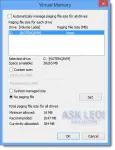Articles in Category: Windows Components
Windows components include the various and sundry applications that make up Windows itself, as well as many of the design and implementation characteristics of Windows.
Why do new windows open underneath others?
Usually a new window will open on top of previous windows. There are several things that may cause a window to “pop under” the window you’re looking at.
How Much of the Swap File Actually Gets Used?
How much a swap file gets used depends on how much RAM your computer has, and what’s running on it at any given time. Knowing that will also help you decide where to place the file.
Should I Use Windows File Compression?
Windows File Compression automatically compresses files so they take up less space. In the best of circumstances, it can free up a lot of space, but all too frequently it’s not as much as you might expect, and there is a cost.
Changing Windows Explorer Settings
Windows Explorer is a ubiquitous and under-appreciated component of Windows 7. I’ll look at some settings I recommend changing if you’re a frequent user, and include a bonus tip that can sometimes speed up Windows Explorer’s start-up.
How Do I Access a Tile on a Hard Drive From Another Windows Installation with Restrictive Permissions?
Windows is not Unix. What you need to be is the administrator on the machine
that you have these disks installed on.
Why Does Nothing Happen When I Insert a Disc?
Nothing happens when you insert a disc if autoplay is turned off. That’s good for security but bad for convenience. I’ll look at alternatives.
Why should I Turn Windows AutoPlay Off?
Autorun is an increasingly used attack vector for malware. Common techniques to turn it off are incomplete. I’ll show you how to turn it off, and recommend you do so.
Why Can’t I Rely on System Restore for Backups?
There’s much confusion about what System Restore actually is and is not. In a nutshell, it’s safest not to rely on it to restore your system.
How Do I Keep CHKDSK from Running on every Start Up?
There are times when the disk checking utility needs to run before you boot into Windows. Sometimes it seems to get stuck and does so every time.
What Windows Services Can I Turn Off?
People are concerned about how much software is running on their machines, and when they look at the list of services, there’s a long list of things they don’t understand.
Can I Have Too Many Drivers?
This is a classic case of “Theory” versus “Practice”. In theory everything should just work. In practice? Not so much. In fact, it’s one of the causes of something called “software rot”.
How do I find the Windows CD Key from the CD?
We’ll look at where to find your Windows CD Key.
Where is it alright for svchost.exe to be?
Svchost.exe is frequently spoofed by viruses attempting to hide. The official copy should be in your Windows\system32 folder, but there may be others.
Why is there a blank entry in my msconfig startup entries?
There are several places that items can get added to the startup list. This particular situation is most likely a malformed registry entry. MSConfig is a nice enough tool for simple situations, but to diagnose this one, I’d break out a bigger gun. I had to, in fact. I looked, and sure enough … I … Read more
Can I move or delete my I386 directory to free up some space?
The question others are asking is probably “OK, so what’s a C:\I386 directory?” In a nutshell, it’s a copy of Windows, and yes, you can move it, but I don’t recommend deleting it completely. It’s just too darned useful.
I Have No C: Drive, But Some Programs Insist On It. What Can I Do?
Most people don’t realize that using “C:” as the primary drive on your computer is fairly arbitrary. It’s a good practice, if only to avoid the problems you’re running into, but as you’ve seen you don’t need to have it that way. You can build a system that boots from a drive of a different … Read more
How do I schedule a program to run on my machine periodically?
The Linux readers are all shouting “cron!” at their computers. Windows has something similar, of course. And it’s very, very flexible. Just fairly well hidden.
How do I resolve my problem with appcompat.txt?
Here’s what to do when you see appcompat.txt.
Why does my computer go nuts sometimes?
If you have speech recognition always enabled it can cause your computer to “go nuts” because of the different sounds it interprets as actual words.
Can I delete lsass.exe? svchost.exe?
Lsass.exe and svchost.exe are required system files for Windows. If you delete them without care, your system may become unbootable.
What are "LSASS", "LSASS.EXE" and "Sasser" and how do I know if I'm infected? What do I do if I am?
LSASS is a Windows component shown in error messages, often due to a virus infection such as Sasser. Learn about LSASS, LSASS.EXE and how to stay safe.
Svchost and Svchost.exe – Crashs, CPU maximization, viruses, exploits and more.
Svchost (and Svchost.exe) is a required Windows component that often shows up in errors caused by viruses. Review Svchost, Svchost.exe, and how to stay safe.
Can the Same File Have Two Different Names?
It’s possible to have two different names for the exact same file on disk. The tools, like the concept, are a little obscure but can be very useful.
How can I disable my “Windows” key? Or for that matter, remap my entire keyboard?
Outside of a few standard layouts, truly customizing the layout of your keyboard is typically harder than you might expect.



